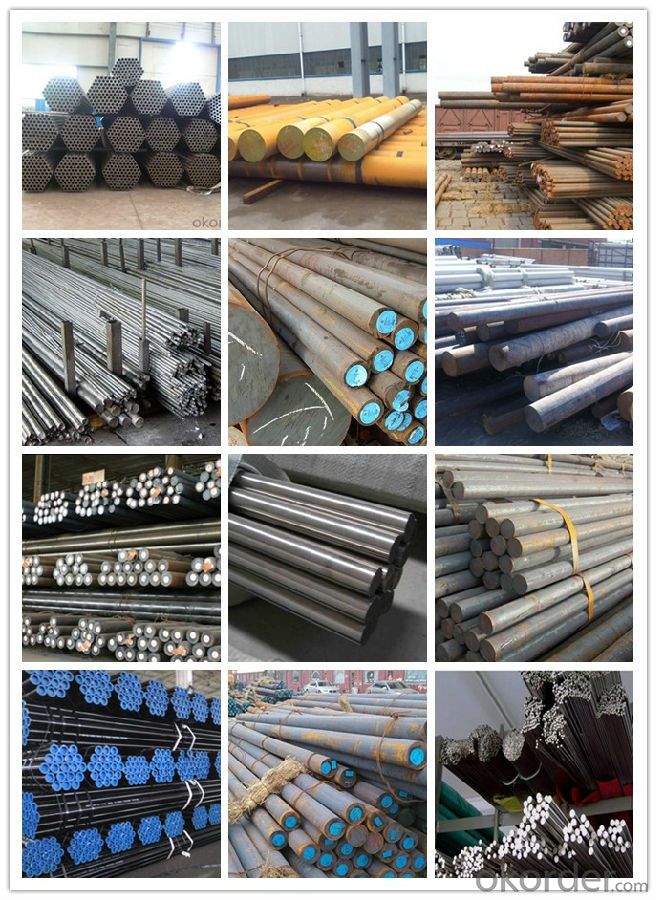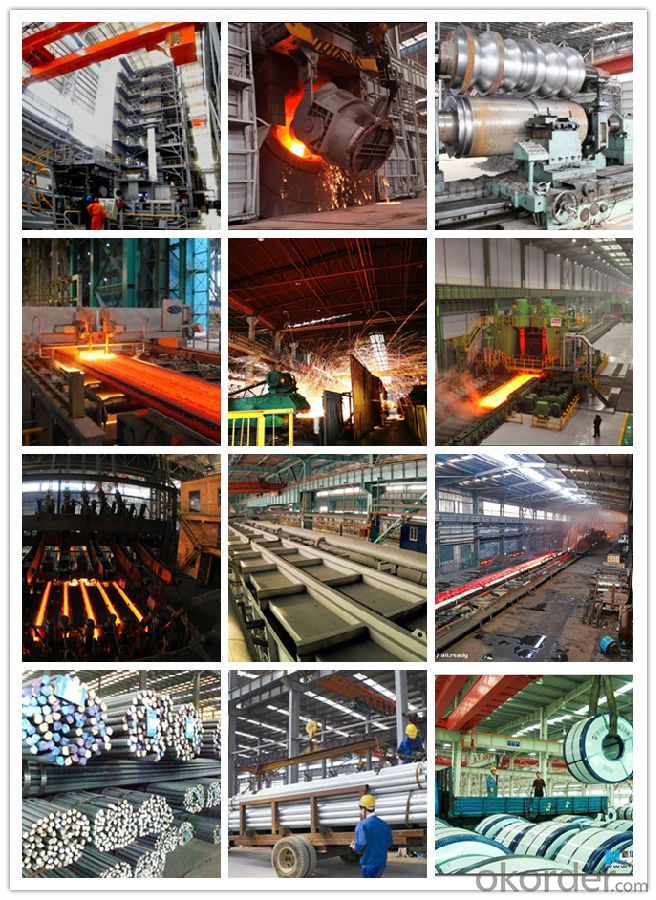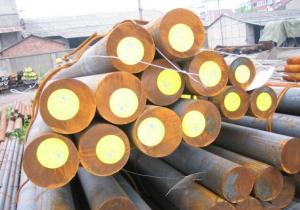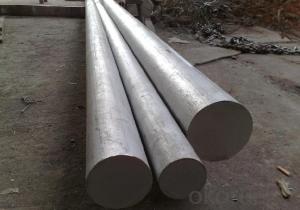HRB 400 Steel Rebar, Deformed Steel Bar
- Loading Port:
- China main port
- Payment Terms:
- TT OR LC
- Min Order Qty:
- 25 m.t.
- Supply Capability:
- 1000 m.t./month
OKorder Service Pledge
OKorder Financial Service
You Might Also Like
Item specifice
HRB 400 Steel Rebar, Deformed Steel Bar
Product information
1. Produce Standard: GB, AISI, ASTM, SAE, EN, BS, DIN, JIS
2. Produce processes: Smelt Iron -EAF smelt Billet - ESR smelt Billet -Hot rolled or forged get the steel round bar and plate
3. Heat treatment: Normalized / Annealed / Quenched+Tempered
4. Quality assurance: All order we can received third party inspection, You can let SGS, BV,.. and others test company test and inspect our products before Goods shipping.
Product detail
deformed steel bar steel rebar Chemical components (%)
| Grade | C | Si | Mn | P | S | Ceq |
| HRB335 | 0.25 | 0.8 | 1.6 | 0.45 | 0.45 | 0.52 |
| HRB400 | 0.25 | 0.8 | 1.6 | 0.45 | 0.45 | 0.55 |
Product show

Work shop

Our Services
* Welcome to contact us with your detailed inquiry, you will be replied within 24 hours.
* You are promised to obtain the best quality, price and service.
* We'd like to provide samples for your confirm.
- Q:What are the main factors affecting the wear resistance of special steel?
- The main factors affecting the wear resistance of special steel include the composition of the steel, the hardness and microstructure of the steel, the presence of carbides or other hardening elements, the surface finish and treatment of the steel, and the operating conditions in which the steel is used.
- Q:Can special steel be used for making electrical components?
- Indeed, electrical components can indeed be crafted using special steel. Special steel denotes a collection of steels boasting distinct properties and features that render them fitting for diverse uses, including electrical components. These steels are frequently tailored to possess exceptional electrical conductivity, minimal electrical resistance, commendable magnetic traits, and outstanding heat endurance. They are commonly employed in electrical engineering scenarios where utmost performance and dependability are indispensable, such as the production of transformers, motors, generators, and electrical transmission systems. Furthermore, special steel can also furnish protection against corrosion and elevated temperatures, thereby augmenting its aptness for the manufacturing of electrical components.
- Q:What are the factors to consider when selecting special steel for a specific application?
- When selecting special steel for a specific application, some important factors to consider include the required strength and hardness, corrosion resistance, temperature resistance, machinability, weldability, and cost. Other factors may include the desired surface finish, dimensional stability, availability, and any specific industry or regulatory requirements.
- Q:How is silicon steel used in electrical transformers?
- Silicon steel is used in electrical transformers as it possesses high magnetic permeability and low electrical conductivity, making it an ideal choice for the core material. The silicon content in the steel increases its resistivity and reduces the energy losses caused by eddy currents. This allows for efficient energy transfer and minimizes heat generation within the transformer.
- Q:How does special steel perform in additive manufacturing applications?
- Special steel performs well in additive manufacturing applications due to its high strength, durability, and resistance to wear and corrosion. The unique properties of special steel, such as its ability to withstand high temperatures and extreme environments, make it an ideal material for 3D printing processes. Additionally, the flexibility and customization offered by additive manufacturing allows for the creation of complex geometries and intricate designs, further enhancing the performance of special steel in various applications.
- Q:What are the applications of special steel in the electronics industry?
- Special steel is widely used in the electronics industry due to its unique properties and benefits. Some of the applications of special steel in this industry include the manufacturing of electronic components, such as connectors, springs, and contacts, which require high strength and corrosion resistance. Special steel is also used in the production of magnetic cores for transformers and inductors, as it exhibits excellent magnetic properties. Additionally, special steel is utilized in the fabrication of precision tools and equipment used in electronics manufacturing processes, ensuring high precision, durability, and reliability. Overall, the applications of special steel in the electronics industry contribute to enhanced performance, efficiency, and longevity of electronic devices and systems.
- Q:What are the different methods of preventing stress relaxation in special steel?
- There are several methods of preventing stress relaxation in special steel. One method is through heat treatment, specifically through the process of annealing. Annealing involves heating the steel to a specific temperature and then slowly cooling it down. This process helps to relieve internal stresses within the steel and prevent stress relaxation. Another method is through the use of stress relieving techniques. These techniques involve applying controlled amounts of stress to the steel, typically through cold working or mechanical deformation. By doing so, the steel is able to release any built-up stress and prevent relaxation over time. Additionally, the use of alloying elements can also help prevent stress relaxation in special steel. Certain alloying elements, such as molybdenum and chromium, can improve the steel's resistance to stress relaxation by enhancing its strength and stability. Lastly, proper design and engineering of components can also play a role in preventing stress relaxation. By considering factors such as load distribution, material thickness, and stress concentration points, engineers can minimize the risk of stress relaxation in special steel applications. Overall, a combination of heat treatment, stress relieving techniques, alloying elements, and thoughtful design can be employed to prevent stress relaxation in special steel.
- Q:What are the different methods of improving the toughness of special steel?
- There are several methods of improving the toughness of special steel. One common method is through heat treatment, such as quenching and tempering, which involves rapidly cooling the steel to increase its hardness and then reheating it to improve its toughness. Another method is alloying, where elements like nickel, chromium, and molybdenum are added to the steel to enhance its toughness. Additionally, refining the steel's microstructure through processes like grain-size control and precipitation hardening can also improve its toughness.
- Q:What are the different joining methods for special steel?
- The different joining methods for special steel include welding, brazing, soldering, and adhesive bonding.
- Q:How does special steel contribute to the chemical resistance of products?
- Special steel, also known as stainless steel, contributes significantly to the chemical resistance of products due to its unique composition and properties. These steels contain a high percentage of chromium, which forms a thin, passive oxide layer on the surface of the steel. This oxide layer acts as a protective barrier, preventing corrosive substances from coming into direct contact with the steel and causing chemical reactions. The chromium in special steel forms a stable oxide layer that is highly resistant to corrosion, even in harsh chemical environments. This oxide layer is self-repairing, meaning that if it is damaged or scratched, it will quickly reform and continue to protect the steel. Additionally, the presence of other alloying elements such as nickel and molybdenum further enhances the chemical resistance of special steel. The chemical resistance of special steel extends to a wide range of corrosive substances, including acids, alkalis, and salts. This makes it highly suitable for applications in various industries such as chemical processing, pharmaceuticals, food processing, and marine environments. By using special steel in the manufacturing of products, the risk of chemical degradation and corrosion is significantly reduced. This leads to increased product lifespan, improved performance, and reduced maintenance costs. Furthermore, it ensures that the integrity and safety of the products are maintained, as chemical resistance is crucial in preventing leaks, contamination, and structural failures. In summary, special steel contributes to the chemical resistance of products by forming a protective oxide layer on its surface, which shields it from corrosive substances. Its unique composition and properties make it highly resistant to chemical degradation, ensuring the longevity and reliability of products in various industrial applications.
1. Manufacturer Overview |
|
|---|---|
| Location | |
| Year Established | |
| Annual Output Value | |
| Main Markets | |
| Company Certifications | |
2. Manufacturer Certificates |
|
|---|---|
| a) Certification Name | |
| Range | |
| Reference | |
| Validity Period | |
3. Manufacturer Capability |
|
|---|---|
| a)Trade Capacity | |
| Nearest Port | |
| Export Percentage | |
| No.of Employees in Trade Department | |
| Language Spoken: | |
| b)Factory Information | |
| Factory Size: | |
| No. of Production Lines | |
| Contract Manufacturing | |
| Product Price Range | |
Send your message to us
HRB 400 Steel Rebar, Deformed Steel Bar
- Loading Port:
- China main port
- Payment Terms:
- TT OR LC
- Min Order Qty:
- 25 m.t.
- Supply Capability:
- 1000 m.t./month
OKorder Service Pledge
OKorder Financial Service
Similar products
New products
Hot products
Related keywords






























